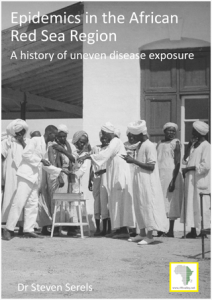Summary
The sustained movement of people, goods and ideas across the African Red Sea Region has been and continues to be so intense that it binds together communities throughout the region in a unified multifaceted socio-economic system that transcends ethnic, linguistic and political divides.
Where people went, viruses, bacteria and parasites followed. As a result, this region—comprised of present-day Sudan, Eritrea, Ethiopia, South Sudan, Djibouti and Somaliland—should be treated as a single disease environment.
This report examines the history of epidemic disease in this region in order to shed light on the current COVID-19 pandemic and its likely course. Rather than attempt to be comprehensive, this study focuses on three diseases that have caused at least one serious regional epidemic over the past two hundred years: Cholera, smallpox and syphilis.
The courses of these epidemics have been shaped by political violence and structural poverty. These two forces combined have led to an intensification of human migration across the region and to the growth of cities, creating new patterns of disease transmission and potential nodes of infection.
Over the last two centuries, the regional disease burden has shifted. Previously, risk was shared across various segments of society. At present, however, there are new social classes that are uniquely exposed to contagious infectious diseases, including refugees and internally displaced people living in camps and settlements, and the urban poor.
This uneven disease exposure will likely structure the course of the current COVID-19 pandemic. High-risk groups also tend to suffer from malnutrition or undernutrition and other previously under-control diseases rendering them even more vulnerable as COVID-19 spreads through the region.
This report is a product of the X-Border Local Research Network, a component of the FCDO’s Cross-Border Conflict—Evidence, Policy and Trends (XCEPT) programme, funded by UKaid from the UK government. The programme carries out research work to better understand the causes and impacts of conflict in border areas and their international dimensions. It supports more effective policymaking and development programming and builds the skills of local partners.




